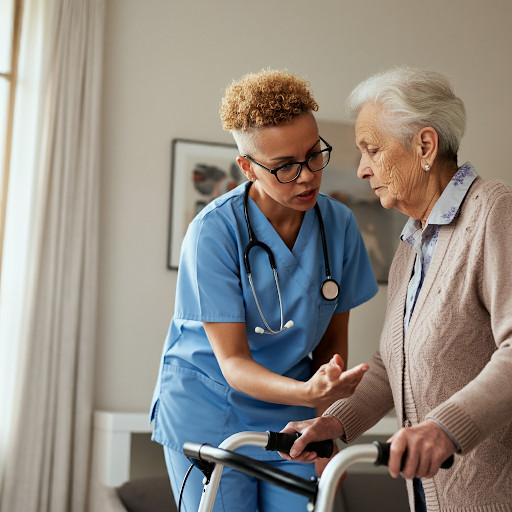Home is where we feel safest and most comfortable. However, for those receiving home health care, certain modifications and precautions can make the home environment even safer. Here are some tips to help you or your loved ones stay safe and sound while receiving care at home.
Preventing Falls
Falls are a common hazard, especially for elderly and frail individuals. Here’s how to minimize the risk:
- Remove Tripping Hazards: Clear clutter, secure loose rugs, and ensure that all electrical cords and wires are properly taped down or out of the way.
- Improve Lighting: Ensure that all areas of the house, including hallways and stairways, are well-lit. Nightlights can be helpful for nighttime bathroom trips.
- Install Grab Bars: Install grab bars in the bathroom, especially near the toilet and in the shower or tub.
- Use Non-Slip Mats: Place non-slip mats in the bathtub and on shower floors to prevent slipping.
- Wear Supportive Footwear: Avoid walking around in socks or slippers. Instead, wear supportive shoes with good traction.
Ensuring Quick Access to Help
In an emergency, every second counts. Here’s how to ensure you can quickly contact help:
- Keep a Phone Handy: Keep a phone within reach at all times, especially in the bedroom and bathroom. Consider a medical alert system with a wearable button for emergencies.
- Emergency Contacts List: Keep a list of emergency contacts prominently displayed near the phone or programmed into your speed dial.
- Medical Information Accessible: Ensure that your medical information, including allergies and current medications, is easily accessible to first responders.
Additional Safety Tips
- Medication Management: Use a pill organizer to ensure that medications are taken correctly.
- Fire Safety: Check smoke detectors regularly and keep fire extinguishers easily accessible.
- Carbon Monoxide Detectors: Install carbon monoxide detectors in the home, especially near bedrooms.
- Home Security: Ensure that all doors and windows are locked, especially at night. Consider a home security system for added peace of mind.
Professional Home Care Services Can Help
Professional Home Care Services can assist with a home safety evaluation and provide recommendations for modifications and assistive devices. Our caregivers can also help with medication management, meal preparation, and other tasks to ensure a safe and comfortable home environment.
Remember: By taking some simple precautions, you can make your home a safer place for yourself or your loved ones receiving home health care.
Disclaimer: The information provided in this blog article is intended for general knowledge and informational purposes only, and does not constitute medical advice. Please consult with a qualified healthcare professional 1 for any health concerns or before making any decisions related to your health or treatment.

Recent Comments